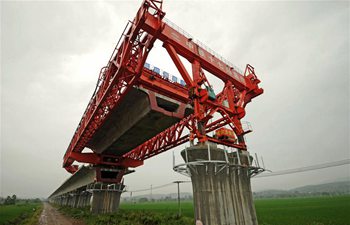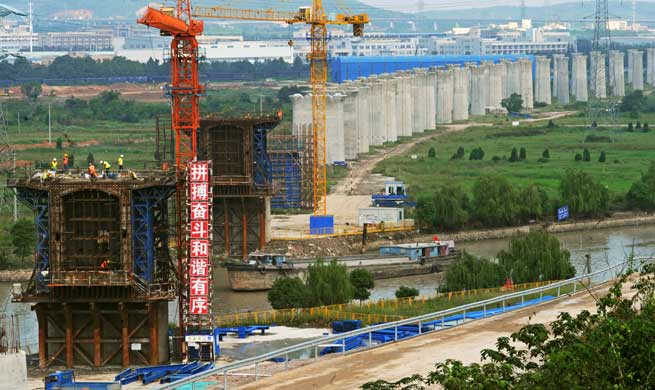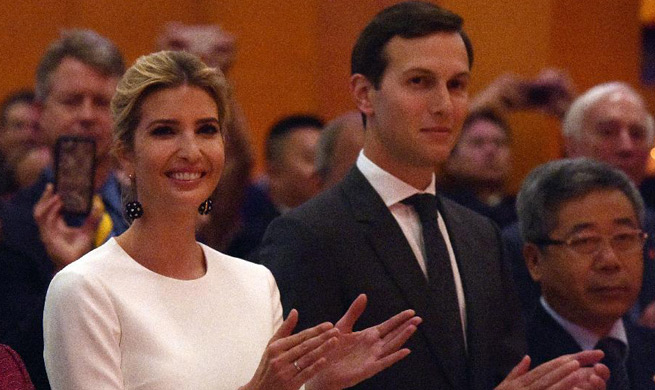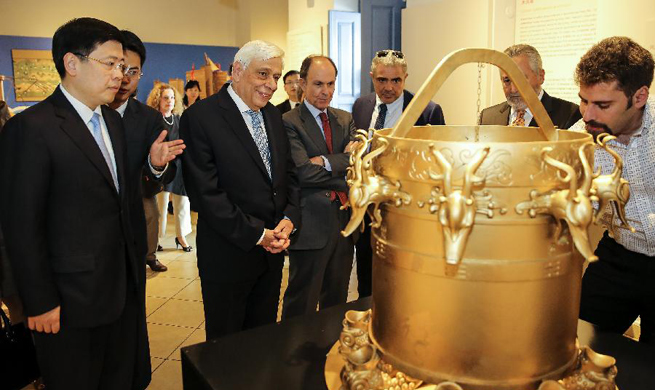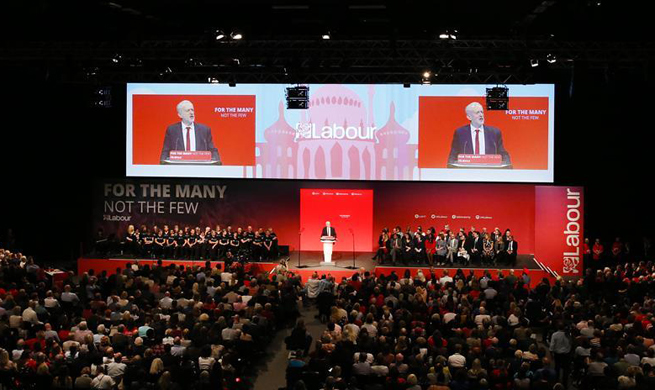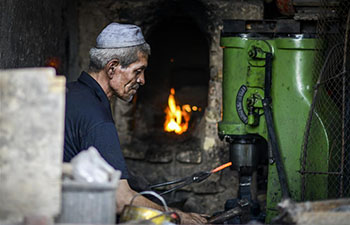TOKYO, Sept. 28 (Xinhua) -- Japanese Prime Minister Shinzo Abe on Thursday dissolved the more powerful lower chamber of Japan's bicameral parliament and called a general election as a number of opposition parties have held talks about ways they could collaborate to better take on Abe's ruling coalition.
The general election will be held on Oct. 22, with official campaigning set to start on Oct. 10. Abe dissolved the lower house as soon as it convened at noon (local time) for an extraordinary session.
The lower house speaker on Thursday read the official declaration to dissolve the chamber while a number of opposition members boycotted the session as some of them believed Abe was avoiding debate over accusations of influence-peddling scandals he is currently involved in.
Much to the chagrin of opposition parties, Abe made no policy speech, shirked any parliamentary debate and held no press conference afterwards.
Not holding an extraordinary Diet session, along with irritating the opposition camp saw one member of the Japanese Communist Party recently stating that not only had the opposition camp insisted the government convene an extraordinary session based on a constitutional provision, but dissolving the lower house without holding any session would violate the constitution.
The overall timing of the dissolution and calling of a snap election, observers have said, is to not allow the opposition camp enough time to fully prepare for the upcoming general election.
However Tokyo Governor Yuriko Koike's newly-formed Party of Hope may see an effective merger with the main opposition Democratic Party to better stand against the ruling Liberal Democratic Party-led (LDP) bloc in the upcoming campaign.
The newly-formed Party of Hope was initially planning to field around 100 candidates nationwide in the upcoming polls, which is not enough numerically to force a change in government, as is the party's eventual aim.
Democratic Party leader Seiji Maehara, just three weeks into his tenure, has had to contend with disunity and defections from his party, but on Wednesday intimated that his party may allow its candidates to run under Koike's banner in the election, while possibly joining forces with the minor opposition Liberal Party, headed by political heavyweight Ichiro Ozawa.
When factoring in a potential hefty quota of candidates inherited from the Democratic Party, the opposition allies could then forge some serious headway on its nationwide campaign, that Abe's coalition has not itself prepared for.
In addition, to ensure Koike's new party in term of its policies is clearly distinguishable from Abe's ruling coalition, the Party of Hope is a proponent of freezing the tax hike slated for October 2019 and is against Japan's use of nuclear energy and wants to see its plants scrapped.
The Tokyo governor's latest moves follows her Tomin First no Kai's (Tokyoites First party) sweeping victory in the Tokyo metropolitan assembly race in July, seeing off challenges from rival parties including the ruling LDP, which Abe is also the president of.
The Tokyo metropolitan assembly race is widely regarded as a barometer for the future direction of national politics and triggered rumors at the time that Koike was eyeing a return to national politics after her landslide win, as has proved to be the case.
Meanwhile, Koike herself is a seasoned politician having served as a lower house member from 1993 to 2016, at which time she resigned to run in the gubernatorial election which she won.
She previously held the defense minister portfolio in the Cabinet of Prime Minister Shinzo Abe, but resigned in August 2007 after just 54 days in office.
Koike said she will run her new party and continue on in her role as Tokyo governor.
Abe, for his part, on formally announcing he would call a snap election, said that the dissolution of the lower house and calling of a general election is in essence to seek a mandate on his policies to address Japan's rapidly aging society, falling birth rate and issues of security related to tensions on the Korean Peninsula.
The prime minister recently unveiled a 2 trillion yen (17.8 billion U.S. dollars) policy package to be paid for by an allocation of revenue generated from a tax hike slated for 2019, to service ballooning social welfare costs.
Abe last dissolved the lower house of parliament in Nov 2014 and thereafter led the LDP and its junior Komeito coalition ally to a sweeping victory in the following election in December.
Thursday's dissolution marks the 4th time in postwar Japan that the lower chamber has been dissolved on the day the Diet has convened.
The Japanese leader could theoretically serve until 2021 if he is reelected as party leader next year. This would make him the longest-serving prime minister in Japanese history.
Recent polls, however, have shown that the majority of voters are opposed to this idea.
The public have also been opposed to the calling of a general election within the period of which the prime minister's last term would have naturally ran its course, the latest polls revealed.
Abe has also been accused by opposition parties and the public of calling the snap election as a means of merely extending his grip on power.
Claims that Abe has dissolved the lower house at this juncture have also been leveled at the premier as a strategy by him to avoid having to answer multiple allegations of cronyism by the opposition camp during parliamentary debate.
The Japanese prime minister has said he will step down if his ruling LDP fails to secure a basic majority in the polls next month.
The ruling coalition currently controls 68 percent of seats in the 475-member lower house, including 288 for the LDP and 35 for its coalition partner Komeito.
The total number of seats, however, is set to be reduced to 465 in the next election as part of a reform aimed at reducing the excessive weight given to rural votes under the current system.
Since the recent shake up in national politics of the past 48-hours, Abe has been muted on his contentious plans to amend Japan's pacifist constitution.





